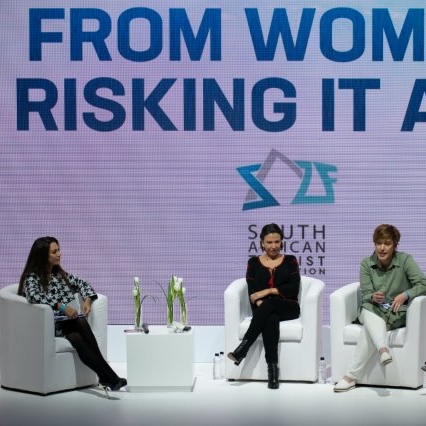
News

Jewish women taking life by the horns
JORDAN MOSHE
The founder of Israeli Flying Aid (IFA) Gal Lusky; conflict journalist Paula Slier; and the head of the department of diaspora affairs at the World Zionist Organisation, Gusti Yehoshua-Braverman, all of whom have gone where angels fear to tread, shared their remarkable exploits and affirmed their Jewish identity at the South African Zionist Federation conference on Sunday morning.
“What choice did I have?” says Lusky. “I had to do it.” Her words, although in reference to her aid work, were equally applicable to her fellow speakers.
Businesswoman Dina Diamond co-ordinated the discussion about what drives these women, and why they chose the paths of humanitarian aid, journalism, and Zionist activism respectively.
Slier says it was her Jewish identity that launched her career. “Being Jewish and wanting to change the world is what motivated me to become a journalist,” she said.
“I attended Waverley Girls High. Sometimes I think that because I attended a school where there were only three Jewish girls, it made me very Jewish.” Reporting behind enemy lines has brought her into contact with hundreds of people, many of whom wouldn’t take too kindly to learning of her Jewish identity.
With the proliferation of information over the internet, it has become increasingly difficult to keep personal information confidential. Slier says she feels increasingly vulnerable as a journalist today. “Sometimes I feel it’s just a matter of time before something happens to me, and at other times, I think it’s down to fate. If I didn’t believe in fate, I’d feel very scared.”
Lusky’s refusal to hate set her upon the path of humanitarian aid. She founded her organisation after her brother was badly wounded in Lebanon during army service. At the time, she bargained with G-d that if her brother recovered, she would do something to help others receive the medical support that he did.
“Nobody asks permission to kill, we don’t ask permission to save lives’,” says Lusky. “I could choose to feel hatred or compassion, and although the latter is harder, it achieves far more. Isaiah said that one needs to commit oneself to taking up the plight of the oppressed, and it is a duty to bring relief to people.”
Like Slier, Lusky is a proud Jew and Israeli, and though she often works undercover, she believes that she shows people Jewish values when she carries out her work.
“When we help people, they see who we really are without knowing it. We are given the chance to ensure that ‘never again’ is something we can do as Jews. No one was there for us during the holocaust, but we can be there for others today.”
Lusky delivers aid to whoever needs it – from Syria to Haiti and everywhere in between – if they are victims of war or natural disaster. These include countries that don’t have diplomatic ties with or are hostile to Israel. It also includes places where other aid agencies have pulled out for safety or diplomatic reasons. “Whether they love or hate Israel, we still have a command to save lives,” she says.
Like Lusky and Slier, Yehoshua-Braverman frequently journeys into hostile territory, but her battleground is words and ideas. “My battle is to engage people in dialogue about Israel,” she says. “I fight for a better future for Israel that will secure a better future for Jews around the world.”
Yehoshua-Braverman’s theatre of war extends into spaces within and without the Jewish community. Aside from promoting Israel and Judaism among people of other faiths and political persuasions, she engages with Jews from across the spectrum about what it means to be Jewish.
“Often I present myself as a Jew and Israeli by choice,” she says. “Being raised in a Jewish home in Israel, I initially assumed all Jews and all Israelis were the same. But, there is a spectrum of both, and this means that we need to ask what it means to be a Jew in a Jewish state. It’s my challenge to make more people conscious about what that means, wherever they live, and no matter how religious they are.”
Because this spectrum is so broad, Yehoshua-Braverman says she doesn’t seek to educate people, but to engage with them.
“I can’t educate people who live a different reality, and have different views,” she says. “Their [experience] is as valid as mine. I need to engage people in discussion because they come from a different perspective, facing the reality of the diaspora or Israel, which is not the same.
“Israel isn’t a perfect state. No country is, but I’m proud of it.”
Yehoshua-Braverman, Slier, and Lusky all agree that representing Israel is increasingly challenging.
Says Slier, “Future wars in Israel will not necessarily be fought on the battleground, but in the media. It’s no longer just about whose army will win, but whose story.”
With ongoing instability in the Middle-East, Slier says her main goal is to stay alive in coming years, and to become more involved in promoting Israel in the media. She says her job as a foreign correspondent might cease to exist in the next 10 to 15 years, as news will go online, meaning people will need to redefine their roles in the profession.
These three heroines remain committed to one aim: giving a human face to the Jewish state and its people, within and without.
Says Slier, “So often, I want to reach across the table, just hold someone’s hand and say, ‘You hate Israel so much, yet here I am sitting as a Jew, and there’s no difference between us.’ At that level, we can make changes, because on a human level, we are the same.”




